Introducing the Inventive, Offbeat,
Dark, Perverse Humor of Robert Criss
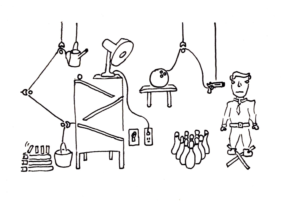
Rube Goldberg Suicide Machine ©Robert Criss
|
I met Robert Criss, at the MET, like a little biatch heh heh heh ho ho ho heh heh heh yah yah yah I met Robert Criss, at the MET, like a little biatch heh heh heh ho ho ho heh heh heh yah yah yah I met Robert Criss, at the MET, like a little biatch heh heh heh ho ho ho heh heh heh yah yah yah I met Robert Criss, at the MET, like a little biatch heh heh heh ho ho ho heh heh heh yah yah yah…
A fitting introduction for Robert’s style of humor.
Segueing into seriousness, Robert Criss is a young-ish humor writer currently living in Atlanta. I first came across his writing randomly during my own early foray into publishing short humor.
I believe the first piece was “Signs That the Person You’re Talking to Might Be from New York.” A relatively conventional conceit (for Robert), tho delivered in a fractionally more unusual, literary style than most such pieces, employing, however instinctively, modernist methods of repetition, anaphora, and symbolic agglomeration, as well as deep and twisty irony, elevating it above the common fare. Plus, my having lived in NYC / Brooklyn for some 8 years, it was pretty on point! Rendering it all the funnier.
Later I came across a few of his more typically offbeat, dark, perverse or boundary-pushing pieces, was further impressed, and felt inspired to do a deeper dive… Messaged to offer my compliments, and we struck up a sporadic correspondence.
Over the past decade to half-decade–due to the consumerist mercenary algorithm-based New Media / Social Media ‘attention economy,’ shortened attention spans, cultural degradation, high printing costs, and other factors–viable humor writing venues keep closing. The coterie of ‘top’ ones increasingly run topical-ish, formulaic, cookie-cutter humor, of ever shorter and shorter length.
Robert’s writing, emerging during this period, is at once informed by this landscape of the fungible and single-premised, but has also managed to subvert it and turn it on its head towards original ends. A marker of vision or creativity transcending the time-and-place.
Robert’s humor tends to be on a higher level conceptually than much of the stuff appearing now. It tends to employ irony, sarcasm, and other subtle comedic devices more deftly, meta-reflexively. Tends to be darker, more offbeat, slapstick, irreverent, black, bawdy, and risk-taking–hearkening back to freer and amply funnier times and styles, when comedians weren’t afraid to push boundaries of decency and propriety, but clearly also contemporary. Conspicuous silence in Comments Sections probably means he’s bravely (and foolhardily) pushing the edge… and silently succeeding! Some contemporary parallels might be Tim Robinson, Nathan Fielder, or John Wilson. (Or John Waters!)
One curious thing about Robert’s writing is that it typically (though not always) lacks most punctuation, save periods, sparse commas, and occasionally has almost none at all. One wonders to what extent this is intentional, what a product of growing up as a ‘Gen Z’ or late ‘Millennial’ in a period when social media, texts, messaging apps, and other cursory forms of communication, stripped of punctuation and emoji-laden, skyrocketed. At any rate, so far he’s made the style work for him and exploited it.
It’s also conversational and colloquial. And often reads like a sketch or play fragment that might work even better performed aloud. At turns stylistically it can come off, if such a thing were possible, as a sort of Cormac McCarthy or Gertrude Stein humor parallel.
As Robert has been prolific in the past three or four years, it’s difficult to select representative and choice pieces from the hundred some he’s published. (And, of course, I haven’t had the chance to read more than a fraction.) Thus, I asked him about his personal favorites, and am including two, which I agree are among his best, as well as a short I like. Also, early examples of his ‘Optical Disillusions’ (explained below). And a few crudely drawn cartoons I especially like. (Like many humor writers, he’s also prone to occasionally combining illustration or cartooning.) I’ll take a great idea coupled with illustrative crudeness over commonality and slickness any day; indeed, in some cases visual awkwardness even enhances. Where are the wonderful crudely drawn cartoons of yesteryear? A short list of pieces for Further Reading appears at the bottom, including the New York piece, and some of his more unorthodox and risqué offerings.
Robert may not be a ‘master’ of the written humor form just yet–are there any contemporary masters?? can there be when publications won’t publish a humor piece longer than 800 words now?!–but (not to jinx anything) he seems to be on his way.
Currently, a complete book of his Optical Disillusions is forthcoming from Weekly Humorist Press. As I understand, over the past year he’s been watching a ton of avant-garde and classic cinema, reading a lot of theater and classic literature, and refining his use of punctuation and grammar a bit. More recently, he’s taken a hiatus from short humor writing to study theater more and try to write a play. Who knows, maybe we have a neo Harold Pinter or August Strindberg (or, you know, Robert Criss) in the making.
Looking forward to the efflorescence of whatever he comes to concoct. (If it be the Spirit’s will.)
–Ed.
|
 |
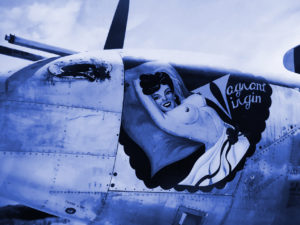
Sir, I Am Not Pleasuring Myself to the Pin-up Girls
Painted on the Side of the Warplanes, Sir
LIEUTENANT: WHAT ARE YOU DOING OUT HERE ON THE AIRFIELD AT THIS TIME OF NIGHT, PRIVATE?
PRIVATE: SIR, I WAS ON PATROL DUTY AND STOPPED MOMENTARILY TO ADMIRE THE WARPLANES, SIR.
LIEUTENANT: WHY ARE YOU ADMIRING THE WARPLANES FROM THE SIDE WHERE THEY PAINTED THE PIN-UP GIRLS, PRIVATE?
PRIVATE: SIR, I BELIEVE THIS SIDE ALONG WITH ALL THE OTHER PARTS OF THE WARPLANE ARE WORTHY OF EQUAL ADMIRATION WHEN THEY WORK TOGETHER TO CREATE THE MIRACLE OF FLIGHT, SIR.
LIEUTENANT: DON’T YOU KNOW THE ENGINE IS THE MOST IMPORTANT PART OF THE AIRCRAFT, PRIVATE?
PRIVATE: SIR, THE ENGINE IS VERY IMPORTANT BUT WHAT IS AN ENGINE WITHOUT WINGS AND WHAT ARE WINGS WITHOUT A FUSELAGE LIKE THE ONE I’VE STOPPED HERE TO RUN MY FINGERS ACROSS, SIR.
LIEUTENANT: THAT SOUNDS LIKE PERFECTLY COMMONPLACE BEHAVIOR TO ME, PRIVATE.
PRIVATE: SIR, YES, SIR.
LIEUTENANT: YOU JUST ANSWER ME ONE QUESTION, PRIVATE.
PRIVATE: SIR, YES, SIR.
LIEUTENANT: WHY DO YOU HAVE YOUR PANTS DOWN TO YOUR ANKLES, PRIVATE?
PRIVATE: SIR, I FELT A BEE CRAWLING UP MY LEG AND REMOVED MY PANTS ALLOWING IT TO ESCAPE BEFORE IT COULD STING ME, SIR.
LIEUTENANT: ARE YOU TELLING ME YOU’RE AFRAID OF A BEE STING, PRIVATE?
PRIVATE: SIR, IT WASN’T SO MUCH THAT I WAS AFRAID OF IT STINGING ME, I WAS TRYING TO AVOID THE STINGING BECAUSE IT WOULD CLAIM THE LIFE OF THE BEE AND I AM A LOVER OF ALL INSECTS PLANTS AND ANIMALS, SIR.
LIEUTENANT: IN THAT CASE, I UNDERSTAND YOUR DESIRE TO PROTECT THIS PLANET, PRIVATE.
PRIVATE: SIR, YES, SIR.
LIEUTENANT: AND CONTINUE AT ALL COSTS TO NURTURE THE PLANT AND ANIMAL LIFE AROUND YOU FOR EARTH IS OUR ONLY HOME AND MOTHER NATURE ITS GREATEST GIFT, PRIVATE.
PRIVATE: SIR, I WILL, SIR.
LIEUTENANT: BUT BEFORE YOU DO THAT, EXPLAIN TO ME WHY I RECEIVED REPORTS OF LOUD MOANING COMING FROM THIS AREA, PRIVATE.
PRIVATE: SIR, I GOT CARRIED AWAY BY THE P-51 MUSTANG’S ROLLS ROYCE PACKARD BUILT V-1650-7 MERLIN 12-CYLINDER ENGINE WITH ITS 1490 HORSEPOWER, A MAXIMUM SPEED OF 500 MILES PER HOUR, AND SIX .50 CALIBER MACHINE GUNS—TWO WITH 270 ROUNDS PER GUN, FOUR WITH 400 ROUNDS PER GUN—ALONG WITH ITS 37-FOOT WINGSPAN, 13-FOOT HEIGHT, AND 32-FOOT LENGTH THAT MAKE UP 12,300 POUNDS OF PURE AMERICAN MUSCLE, SIR.
LIEUTENANT: WELL THAT SOUNDS TOTALLY WITHIN THE CONFINES OF SOCIALLY ACCEPTED ACTIVITY, PRIVATE.
PRIVATE: SIR, YES, SIR.
LIEUTENANT: AND I’D LIKE TO COMMEND YOU FOR YOUR METICULOUS RESEARCH AND DEEP APPRECIATION OF THE AIRCRAFT, PRIVATE.
PRIVATE: SIR, THANK YOU, SIR.
LIEUTENANT: AND I’LL LET YOU CONTINUE YOUR PATROL IF YOU TELL ME WHY YOU ARE HOLDING THAT BOTTLE OF LOTION AND TOWEL, PRIVATE.
PRIVATE: SIR, I WAS USING THIS TOWEL TO WIPE OFF THE FINGERPRINTS I’D MADE ON THE AIRCRAFT THAT MIGHT LEAVE UNFLATTERING SMUDGES VISIBLE IN DIRECT SUNLIGHT DURING MORNING INSPECTION TOMORROW, SIR.
LIEUTENANT: AND THE LOTION, PRIVATE?
PRIVATE: SIR, THE LOTION IS HERE TO RESTORE MY FINGER OIL AFTER MUCH OF IT IS TRANSFERRED ONTO THE MACHINERY IN THE ACT OF CARESSING THE AIRPLANES, SIR.
LIEUTENANT: PRIVATE, YOU’RE TELLING ME WHILE YOU WERE ADMIRING OUR ARSENAL YOU BROUGHT ALONG A TOWEL TO PRESERVE THE AESTHETIC INTEGRITY OF THE PLANE AND A LOTION BOTTLE TO MAINTAIN A BALANCED AMOUNT OF OIL ON YOUR FINGER AND WHILE MOANING LOUDLY FROM THE PURE ECSTASY THIS ACTIVITY GAVE YOU, YOU NOTICED A BEE CRAWLING IN YOUR PANTS SO YOU REMOVED THEM AND THIS ALL OCCURRED SPECIFICALLY IN THE AREA CONTAINING THE ONLY AROUSING DEPICTIONS OF FEMALE SPECIMENS ON THIS ENTIRE AIR-BASE FULL OF MEN AND ONLY MEN, PRIVATE?
PRIVATE: SIR, YES, SIR.
LIEUTENANT: ARE YOU LYING TO ME, PRIVATE?
PRIVATE: SIR, NO, SIR.
LIEUTENANT: WELL THEN, PRIVATE, TO REWARD YOU FOR YOUR UNFLINCHING HONESTY AND OUTSTANDING ATTENTION TO DETAIL, I NEED YOU TO DROP YOUR PANTS AND USE THAT LOTION TO PLEASURE YOURSELF TO THE PIN-UP GIRL ON THE SIDE OF THIS PLANE FROM NOW UNTIL ZERO FOUR HUNDRED HOURS SO LONG AS YOU CLEAN UP AFTERWARD WITH THAT TOWEL AND KEEP YOUR MOANING TO A MINIMUM, PRIVATE.
PRIVATE: SIR, ARE YOU SURE, SIR?
LIEUTENANT: THAT’S AN ORDER, PRIVATE!
PRIVATE: SIR, YES, SIR.
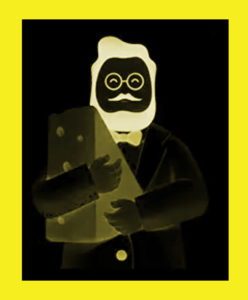
The Doctor Says I Need More Cheese In My Diet
And That You Can Take It Up With Him If You Disagree
Or Think I’m Lying Because I’m Not
Welp, I just had my annual checkup at the doctors and it went well. Yep, tests came back good. Tested high on the high ones, low on the low ones you know. Doctor did recommend I add more cheese to my diet though.
Yeah, he said more cheese because he knows that I like cheese and he said it’s okay to have cheese for every meal. He says the way I feel while eating cheese is good for me because I’m happier. He knows how important cheese is to me and stands by the benefits of cheese consumption.
You think I’m lying? Well, he actually thought you might say that and he told me to tell you that you can take it up with him if that’s the case. He doesn’t like when people don’t trust his prognoses. Takes that kind’ve thing really seriously. So you can take that up with him.
Anyways he also said I should cut out all the exercise I’ve been doing as well. Said I’d be better off eating chicken wings every night from my favorite wing spot. I asked him what flavor and he said what’s your favorite flavor and I said buffalo and he said buffalo it is. I was as shocked as you are but you know he has a degree.
The man studied for 8 years. What am I going to do? Not listen to him? Out of the question. I mean I could get a second opinion. He said it’s not necessary though. So technically that’s a second opinion right there. Just from the same guy who I trust completely.
He told me if I started competing in eating competitions on the weekends that would also be really cool. I asked if it had any health benefits like the no exercise, cheese, and chicken wings diet and he shook his head. He said, “I just think it would be really cool if you did. You might even get on my wall of fame, who knows.” It’s this bulletin board near the reception desk where only pictures of his favorite patients are featured for all to see. I’ll admit, I want my picture on there badly.
Here, this is his home phone number that you can call to verify. Don’t call now he’s still at the office but go ahead and leave a message if you’re so sure he’s wrong. He invites criticism. But he’s a busy man. Might take a few days to get back to you is all I’m saying.
Like I said, the tests came back good as far as I know. I mean at least he said they did he didn’t go into specifics. Kind’ve brushed over them. His main goal was teaching me how to swallow the most ice cream while under a time constraint without getting a brain freeze. The trick is to keep a warm rag underneath your hat.
Trust me I know how it sounds. When I told him I wasn’t so sure about his methods he told me to strip down to my underwear. He then proceeded to feel around in my underwear and said, “Yup, they’re still there. Just checking.” Then he parted his coat to show off his souvenir t-shirt underneath he earned from eating six pounds of ice cream in under three hours. You can’t make this stuff up!
Ask yourself, what would I gain from lying? I’d be able to eat all the foods that I want at any time? That doesn’t sound fun to me at all. From what I’ve heard previous to my appointment, that’s putting my life at risk.. But, hey, someone’s gotta do it.
Though I had to ask him about my heart health. Coronary artery disease runs in my family. It killed my father. That’s when he got very serious. He told me the best thing a man my age can do for his heart is extreme sports. He said stuff like paragliding and whitewater rafting is going to keep me alive longer. He said testing the heart and putting the most strain on it as humanly possible will no doubt make it stronger over time.
I didn’t understand that part. How was I going to be fit enough for extreme sports by not exercising and eating only my favorite foods?
He explained that the heart is a muscle like a bicep or deltoid and the only way those get stronger is if you tear up the old muscle tissue by lifting weights and eating protein to create new muscle. So I can neglect the other muscles in my body as long as I treat my heart the way a latissimus dorsi is treated by twelve sets on a cable machine. By putting myself in heart attack scenarios, my heart is given the greatest workout of all.
I said, “Really?” And he said, “Yeah something like that.”
I tried stumping him by asking if the “apple a day keeps the doctor away” thing was true. Surprisingly, he said it works but most people get it wrong by eating gala or fuji apples. Surprisingly, he said people should be eating caramel apples every day, dentists are making people “soft,” and that basically everything I thought I knew about nutrition was not only wrong but also cringeworthy. In fact, every time I said the words nutrition or health he would visibly shudder and put a finger to his lips.
“The only ‘meal prepping’ you should be doing,” he said, “is with pancakes.”
So, yes, that’s why I brought home a week’s worth of wings, fondue, and ice cream. Doctor’s orders.
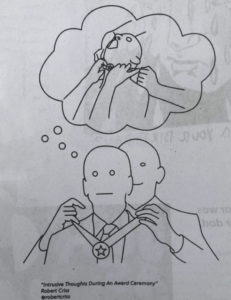
Intrusive Thoughts During An Award Ceremony ©Robert Criss
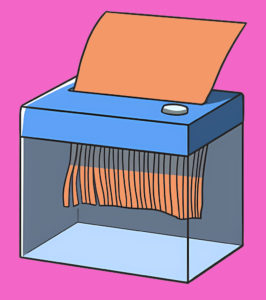
Results of the survey I conducted
asking people if they like my new hat
Mother: Do I like your new hat? I LOVE your new hat. You’ve really bounced back from the incident with the paper shredder and your genitals.
Father: Pal, I think you look just wonderful in your new hat. I’m really proud of you and the way you’ve composed yourself in the wake of the paper shredder thing.
My friend, Tom: I like your hat so much I’m actually a little jealous I didn’t find it first. And I heard about the accident at your workplace. That’s terrible. My family is praying for you.
My co-worker, Lisa: Your new hat is killer! Also, the custodian said your office is clean enough to return to work now.
Custodian: After many days of scrubbing and powerwashing, we were able to clean up the walls, floor, desk, and ceiling. The rugs did not make it. I haven’t seen your new hat.
My doctor: Your new hat looks great, I could never pull it off. It is super cool. Just don’t go too crazy while you’re wearing it. You’ll rip your stitches.
Insurance adjuster who called me: Your coworker told us that you went to sit on the paper shredder but your pants ripped exposing your genitals right before you sat down. We’re following up with you to determine if that story is accurate. I’d love to talk about your new hat, as I’m sure it’s nice, but it’ll have to wait.
Optical Disillusions
|
Several years ago Robert began experimenting with the idea of ‘Optical Disillusions’: optical illusions with a twist, which humorously and sarcastically disillusion the viewer. Eventually he created a full-length book, accepted by Weekly Humorist Press and forthcoming.
At this point it seems there are few novel humor concepts left ‘untapped,’ and Robert instinctively honed in on one. Optical illusions + black humor = Disillusion. An original sphere that hasn’t been comically explored much.
Below are some of the earlier Disillusions (not appearing in the book) he’s at liberty to share.
|
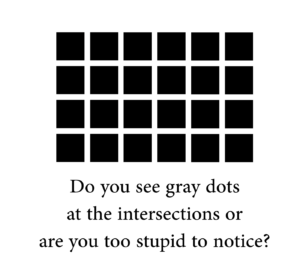
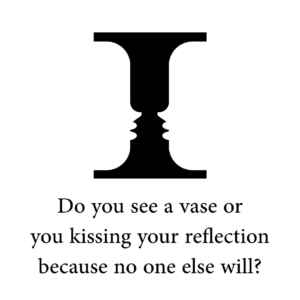
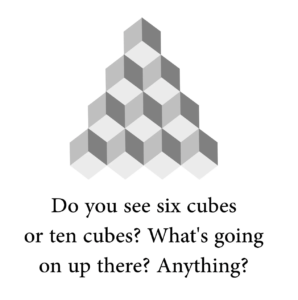
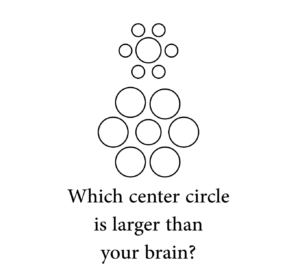
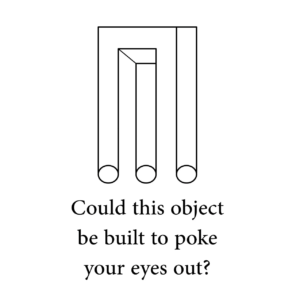
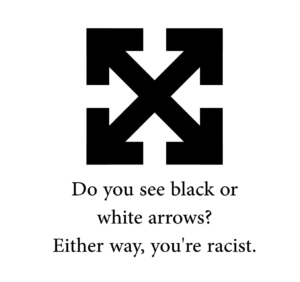
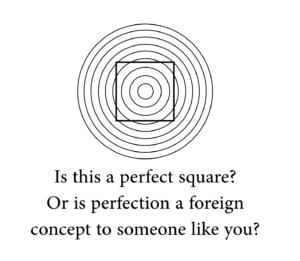
Further Reading
Signs That the Person You’re Talking to Might Be from New York
Alvin And The Chipmunks’ Christmas Song The Year After Alvin Died
Farm to Table. Table to Fork. Fork to Mouth. Food to Throat. Air to Throat. Hands to Chest. Hands to Chest. Hands to Chest.
Oh No, I Just Realized I’ll Never Be Able To See The Elephant’s Foot At Chernobyl!
I Was Really Moved By Your Beautiful Trombone Solo Until You Pressed A Button And Made The Instrument Ejaculate A Liter Of Spit
I Think The Red Line Crossing Out The Swastika On Your Shirt Could Be A Tad Thicker
I Hope I Didn’t Embarrass You By Shitting My Pants While We Sat Courtside At The Laker Game
The Lost Final Chapter of Helen Keller’s Biography
What’s the Best Part About Your Entire Family Dying From COVID?
Why Do I Even Bother? It’s All Been Said Before In My Novel Series Detective Kojak Pikachu-Holmes And The Ambiguous Origin of Chinese Checkers That’s Been Overlooked For Far Too Long
Full List of Humor Writings & Visuals on His Website
—About the author, Robert Criss

Night Shades
|
An excerpt from Fugitive Dreams, a literary supernatural thriller in progress by Matthew Murphy
|
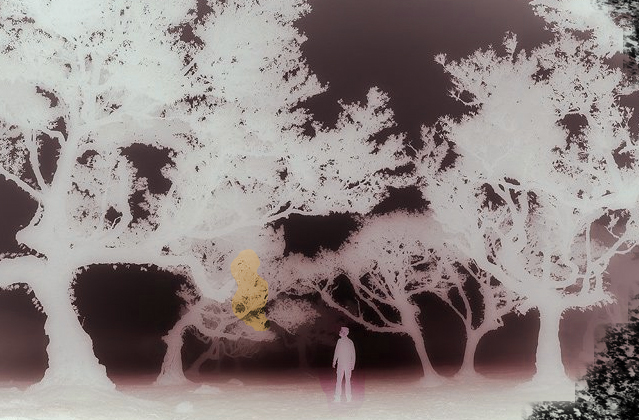
When his eyes opened he found himself curled into a crescent against the corrugated metal of the culvert, wedged into the exact position he was in when he fell asleep. It was still dark, the wee hours of the night when desires ran loose and dreams filled the world with their allusive illusions, their mirage worlds built of hopes and fears and insecurities, their shifting vistas ever-changing, the space behind them infinite.
For a moment all was still and quiet save for a puff of breeze exhaling through the pipe that lifted a strand of his hair and tickled his scalp, sending a not unpleasant shiver down his back. He took stock of himself and his surroundings—he was Tommy Roenick, it came to mind, and he was a fugitive from a federal penitentiary, had been so for over a day now as a matter of fact, and he was now cowering in a wet culvert under a country road somewhere up in the northern reaches of the province. His father he had never met, his mother and brother were dead, and he was all alone in the world, more so now than ever. And he hadn’t eaten in a day and a half.
He looked drowsily to his left, at the open mouth of the culvert, at the small creek of runoff rivulets now silver in the moonlight, and thought of how pretty it looked in the hint of light that sifted spectral from the sky. As he did so, hoping to once again close his eyes and catch another hour or two of sleep, he felt on his other side a sudden feeling of arctic coldness, encroaching and drawing what warmth there was away from him. He turned, and when he saw what was there he froze with fear.
He was not alone.
A couple metres away hunched a shadowy presence, as if coalesced out of the very darkness, drawing shade as well as heat. He was unable to even gasp, the sound locked in his throat. He felt paralyzed, much like he did back in his solitary cell when a shadowy presence hung over him and held him frozen as he lay in his bed. Perhaps this same presence that was crouching in wait in these close confines with him, a blackness, a coldness, an insidious absence.
A high-pitched, whimpery sigh escaped his mouth as though he were deflating, and the sound jarred him out of his frozen trance. He shimmied backward toward the mouth of the culvert, only to see the shadow elongate itself toward him, its spindly arms reaching and stretching, elastic, approaching, encroaching like a darker shade of night unlit by any moon. Again, he backed up a foot toward the mouth of the tunnel and then stopped, realizing that this person, this spirit, this entity, this whatever it was, could reach for him anyway even if he tried to bolt. He looked into the dark blankness of the face cut from the cloth of midnight, tried to see into the blackness for any sign of features, and saw only an indistinct wavering born from the strain of his squinting.
“Who are you?” barked Tommy in a ragged, frightened voice, much like he did in his solitary cell when he felt the presence stalking behind him. “What are you? What do you want from me?”
He heard a low, basso-profundo moaning, a bestial growl coming through the ether like a faraway radio transmission. From here, from there, from everywhere. Or from some other plane entirely.
He gasped, frozen to the spot with fear.
Once again he felt icy fingers seize his heart. He felt cold and fragile in the clutch of this being; he felt invaded and infiltrated and unable to do anything but sit rigid in fear while an invisible force held his heart like a ripe tomato and threatened to squeeze it till it burst inside his chest and his life dissolved into the blackness of the night.
He felt the vise upon his heart tighten, and spots formed in front of his eyes. He gasped in pain and then backed out of the culvert, falling into the muddy puddles of standing runoff below. As he picked himself up off the ground he felt the pressure round his heart slacken, the invisible fingers like cold metal cuffs around his heart unclasping. With the sudden infusion of air into his lungs, he inhaled in relief and took off through a break between the trees, running through the bushes as fast as he could, the twigs snapping against his face, his lungs tugging for air. He tripped over a root and fell headlong onto the rocky path, scraping his hands in the dirt as he put them out ahead of himself to break his fall. No time to lick his wounds. He got back up on strained and rubbery legs and continued running.
Behind, he could hear footfalls on the trail, the rustled parting of foliage, the snap of twigs underfoot. Adrenaline propelled him forward, and he responded to this chemical call with great clarity, legs pumping, feet deftly avoiding the catch of roots, the gnashing stub of rocks. A fork in the trail: which way? Each option trailed off into a night-black hole in the hairy brush. He opted for left and kept running, running and sweating. How long could he keep this up? His legs burned with every stride, the furious pumping of his thighs reaching the limits of muscular exertion.
He stopped a moment to catch his breath and rest his legs. Enfolded in the gnarled, bristling trunks and arms of the forest, and in the cloak of night, he felt as though trapped in a childhood nightmare. He wondered a moment, am I really being chased? Now that he had stopped a moment, the cuts in his back and hand began stinging, singing with pain. He needed a doctor and he knew it. He looked down at his hand, cut badly on the prison sewer-grate, at the dried blood that soaked into the dressing, the blood tracing the jagged fissure of bad luck running through his palm.
A crunch, a crash, the forest transmuting the sound of footfalls to the sound of its own rustled foliage, its own disturbed stones and roots and fallen twigs. An icy presence looming behind him.
A cold breath on his neck.
He continued running. He wished, oh he wished he knew where he was going. He had started out north when riding in the truck. At least he thought so. Now where? What would he run into? And what would happen if he stopped?
The sound of running water, a burbling stream in the bristling nightwood blackness. A few steps ahead through a tangle of twigs and leaves and he could see the flashing water of the stream carrying a quicksilver skim of moonlight on its downward course. He bent down and cupped his hands and slurped several deep handfuls of the cold water, his cut hand stinging, and looked behind him to see if there was some other way he could go to avoid getting drenched.
He saw a slight opening in the tangled weaving of the foliage, and as he parted the branches to further explore he felt invisible talons slice down his left forearm. He gasped in pain and looked down at a row of four deep furrows scratched into his skin, his blood blooming black in the night. He looked all about him, straining his eyes in the darkness, but could see no one or nothing.
Frightened, he jumped into the running water, slipping and sliding among the boulders and tumble of mossy logs and branches. The cold seized his breath. He gained a footing by holding onto the branch of a fallen tree, it reaching up as though for help in its dying fall. He helped himself along, using his grip for leverage, and then slipped down into deeper water, up to his waist, sliding amongst the slimy boulders and sunken branches. His groin froze; his penis protested and withdrew from the temperature, and the flow of water was nearly overwhelming. He feared he was going to be carried away downstream to God knows what fate. He struggled to regain his footing, and paddled himself with struggling, wheeling arms against the current, and he lunged forward and managed to grab a fistful of twigs and leaves dangling from a bent-backed birch leaning over the river from the other side as though to lend a hand. He pulled himself up, straining, with the handful of birch foliage, and he managed his way across, and he disappeared through an opening in the tangled bush and was again enfolded in the spiny embrace of the forest.
* * *
Overhead, the flapping of a crow in the gnarled woven canopy. He was cold, shivering at the base of a cedar, obscured in the foliage. His pants were soaked, and the temperature was dropping, autumn in the air and cooling it fast these darkest hours of the early morning. No sign of his mysterious pursuer anymore, no telltale crunch and rustle through the underbrush, no ominous vibrations of impending approach. It smelled of woodchip earthen dampness, of bitter bark and rotting leaves. The pain in his hand and arm and back had numbed awhile from his dash through the stream, but his nerves were now awakening, and an itchy throbbing now defined the edges of the deep lacerations he had incurred. For all he knew he could now get tetanus, lockjaw, whatever the hell they called it. Where the hell am I, he wondered, and where the hell do I go next?
There was no room for carelessness. The story had surely broken by now. The sky would be abuzz with helicopters in the morning, and the police would be scouring the countryside from high above with binoculars, all the way down through the snouts of sniffing dogs. They had probably been doing so already, were perhaps already near. Every main road was probably blocked at some point; police from every force would be mobilized; even military reservists could be in on the search. Most breakouts did not end well.
He shivered and he shook and he ran his fingers through his hair, and he squatted, too tense to actually sit, too primed to relax. God, how he craved a cigarette now, something to calm the nerves. He felt frightened in the forest, directionless. He looked about and all he could see traced in the blackness was the tangle of the thick impenetrable bush, the bristling forest that grew seemingly from the stones themselves through a thin medium of acidic soil ground under the press of glaciers long retreated to their alpine and arctic redoubts.
He looked about in the oppressive darkness and guessed it was about three o’clock in the morning. It was late whatever the exact time, and he was adrenalized and starving. He felt as though he could not carry on much longer without some sort of a meal and some rest. But the pressure was on to keep moving. Oh Christ, hope I can find some shelter and some food, he thought, I gotta move, I gotta move, and it’s getting cold and I can’t sleep in the open in the bush with the cold and the animals and all the heat that’s surely coming my way. And whatever it is that’s on my tail.
He stood up, embowered in the thick brush about him, and continued his way through the forest, on a winding root and boulder strewn path, feeling his stumbly, uncertain way in the dark, pushing twigs out of the way, brushing against leaves. He heard only his own footsteps, his own heartbeat, the rustle of the foliage and the crunch of stones he stepped upon, with nary a thought as his mind had contracted like his stomach from hunger and nerves and fatigue.
At last, the woods gave out into a stony field, and he walked out watched only by the ancient eyes of stars staring out from the prehistoric past, some long since burned out, their spectres glowing faintly in the night. A cool breeze brushed through the long grasses of the field and through his hair, and it ruffled his sodden clothes. He shivered and kept on his way. An owl hooted. He stood to take stock of where he was, what he should do.
“Okay,” he said aloud, squatting in the field over a pitted table stone in which were embedded the fossilized denizens of an ageless sea, a Braille record of earthen memory, trilobites and shellfish and nameless ancient plants turned to stone in the gorgon stare of half a billion years. His breath smoked in the darkness. “Okay, I think I’ve lost it. I’m fuckin’ crazy. That thing—that thing—fuckin’ chased me all this way.”
He ran his hands through his hair on the sides of his head over and over again for sake of nerves, and continued speaking in the solitude of night. “Then it scratches me. I don’t fuckin’ get it, what’s goin’ on, I don’t understand a goddamn thing. And I’m all—I’m all cut up and bleeding everywhere and I need a fuckin’ doctor.” He stood up and kicked at the earth in impotent rage, dislodging a stone from the grass and the shallow soil.
“And I, I gotta be, I gotta be all over the news by now.” He paced back and forth, a few steps this way, a few steps that, his hands on the side of his face. “I need a fucking smoke, I’d kill for a smoke right now, I’d absolutely kill for a cigarette right now.”
A glance up at the stars in their midnight millions fixed in their burning points into the depthless cold of eternal night, fixed and impassive on his plight. What you need, he thought, weaving his self questioning back under the surface, back into thought, “Is to get your hands on a car,” his thoughts threading out through speech once again. And get your hands on a gun and hit a bank or a store—there’s no way around it—and take the cash. And get to a safe house of some kind so you can make further plans to disappear. Only then can you breathe easy. Only then.
“But now,” he continued aloud, choosing his words with care as he tried to still the mounting and inarticulate panic within him. “Rest. Get some sleep. You have no idea where you’re going or what is even happening right now.”
To this end he walked to the edge of the clearing and sat at the base of a tall cedar. He huddled himself against the cold and he shivered, and he lay his head against the rough bark of the tree, and he clutched the throbbing furrows of his arm with this hand, and he sat, teeth chattering in the coolness of the night, and awaited the arrival of sleep. He dissolved into drowsiness, eyes looking absently out at the darker shades of the trees against the lighter darkness of the night, and as he looked out he saw something in the corner of his gaze.
A pair of yellow eyes were fixed on him in the distance, shining faintly though staring with cold intent. Small pinpricks, hard to make out, but very much there, their indistinct pupils trained on him. A shiver of fear prickled through him.
“Go away,” he mumbled hoarsely, meeting the gaze of the eyes upon him in the night. “Fuck off! Leave me alone, whoever you are!”
But the eyes just stared at him as he muttered another curse and slowly closed his eyes and clutched the furrows in his arm now scabbing over. His own consciousness scabbed over for a while to undo the damage of the last couple days and make him forget the growing, gnawing hunger in his contracting, boiling gut. From time to time he emerged from his shallow, uncomfortable sleep and looked out and saw, or thought he saw, those beady yellow eyes still trained upon him in the blurry darkness.
And when he closed his eyes again he would plunge into staticky electric dreams of shapes and shadows and the breath of his uncle stinking of booze as he wound up to whip him with his belt and the drawn mask of his mother’s face in the prison visiting room and her croaking voice, “Sleep tight in here, Tommy, don’t let the bed bugs bite.” And the whirling sirens of the police upon him escape after escape and… and the twisted, broken shape of Lynne Hurst lying on the pavement as he looked down in horror at what he had done. She suddenly pulled herself up onto her elbows, her movements jerky, unnatural, animated as though her body were a puppet poorly worn by another spirit. Her head turned toward him, the eyes white, a grimace on her dead white face as she looked at him, into him, through him—
And still those eyes when he opened his, burning fires of midnight light, beacons to Bedlam’s shore, he drifting ever closer.
“Sleep tight and don’t let the bed bugs bite,” that haggish croak as his mother hovered over him, her bony fingers clamped upon his throat. She flashed decaying, sharpened teeth as she grimaced, her hands upon his neck squeezing, squeezing, pools of black tar bleeding into his vision, signifying his own extinction—
“Jesus Christ,” he murmured, opening his eyes again, a light breeze blowing through his hair, the eyes upon him still, “I just want to sleep without any goddamn dreams, please God just let me sleep just let me sleep—”
This cycle carried on through the eternity of the wee hours until at last the sky lightened, and the dreams went the way of the darkness.
—About the author, Matthew Murphy

|
New poems by the renowned Beat / post-Beat poet on the state of affairs & the state of the heart in the later years
|
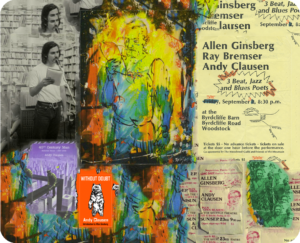
Is It True
Is it true a huge swath of India will be
too hot to inhabit? where hundreds
of millions now live?
Will the land cook?
Where will this massive swelter move to?
A huge cauldron of people cultured to live
their unique manner & outlook
Where will they go?
Is it true Greenland is sweating out millions
of tons of itself into the Rising
of the Great Thaw?
Is it true Venice might be submerged
New Orleans too?
Will many islands disappear?
How about Manhatta?
As fit water is rarefied and the profit motive
derives policy & law & commands
enforcement
So the Big Boy wealth will have just cause
for war as their traditional solution to scarcity
& over population & climate change
Mutated seeds have replaced the Buffalo
The Pacific Ocean is radioactive
Baby Godzillas everywhere
Cameras inside cameras
Every busy corner televised
Yes or No decisions faster than sound
won’t let you escape
Calculates your every future move
Wishing is a curse
Wishing that I could make life
easier for you
An adequate provider instead of a geezer
whose accumulated wealth is in
battered notebooks & a 20 year old
iMac
Who’d be pushing mushrooms
if not for you
I haven’t a foot for games of fun
as in fun & games
At the parties dancing is another country
another era
I’m not getting old I am old
Wisdom is more than caution isn’t it?
Even children of rocky soil
Scions of bedrock smile at
Turn eyes to……flowers
both feral & cultivated
Yesterday’s rebels & revolutionaries
are afraid of change
Now old & compromised
They have their small slice of pie
Yet the Garch have made it mandatory
Change and not just talk of It
or that slice will amount to zilch
They Have An Artist Graveyard In Woodstock
The masses have been molded indoctrinated into
thinking meanness is cool
That we must cold look out for number one
to as always survive
Major Mass Media
Main Stream Media
Violence sells, intrigues
Maybe I’m wrong, that we know
Too much is the problem, maybe
We do better as cattle prodded this way
& that, huddled together
in our own excrement
Waiting for the train to the slaughterhouse?
Artists die here
They even have a special cemetery for artists
It costa money—so does the regular graveyard
Get rid of my carcass cheap as you can
I think burning it will be, if I can’t be dumped
in the Atlantic, my preference
left out for carrion eaters from the sky
But my ashes can go anywhere East Oakland 101st
Ave would be cool so would the Meuse back
in the old country and the Ganges!
Rather one reads my books than a stone marker
A Way Out
The situation we find ourselves in
is driving me to nostalgia for the bottle
I haven’t been drunk in at least 8 years
(Yes what you thought was intoxication
was just my bad personality)
I can’t believe the “Love” Generation is going
to the grave with a whimper
Didn’t you experience the marvelous possible
unseen, seen when our eyes went
supernatural inside dancing molecules
buzzing from body to body?
We hear the mountains speak
They have heard much
They can correct us
The ocean can discipline us
The sky can make life unbearable
or healthy beautiful
The constituents have been hoodwinked
into voting against their interests
Not realizing they/we are examples
of why universal suffrage
can be viewed by some as a failure
We failed to win the war on drugs
(I admit I wanted drugs to win)
We failed in the war on poverty
No one in my recent ancestry was a scholar
Neither my mom nor dad finished hi school
My son Cassidy is a scholar
Are there rooms where the oligarch’s secret ministers
are picking out the assassin & victim?
Perhaps the method will let the well-paid controllers
of data let all falsity slip by on the party line
as facts are rendered meaningless
It drives me crazy when I know good learned people
who think our next political move should be
a compromise an attempt to replicate the recent
past and rely on good old free enterprise system
to suppress the violent revolutions of the
impoverished and busy away from peaceful
petitions of working class they, our version
of free enterprise, will limit the power
of the Garch
The minds behind that direction have no duty to the
future or past (the present defined)
The minds propelling policy—employ hate as the
great equalizer
They want violence
They think their money will protect them
from the massacres and keep their rule extant
Get rid of troublemakers
I’ve been over it myriads of time and I still don’t
know how money does it
Poison darts? maybe not but even depleted uranium
guns need money
The soldiers & officers in harm’s way
with huge harm in their retinue & regime
available but not without money & food
That I don’t have a remedy for the problems
humans face
The words that could solve this inextricable
suicidal dilemma are not forthcoming—
I don’t see someway out of here
no I don’t
I think for now victory for the Garch
is near inevitable
How long before the fellaheen rise again?
As sad and horrible life can be I desire
it goes on as the song stated
“for the good times”
We Will Live To Dance Again
O you were special flaunting that bare shoulder
with spinning moves in the drum circle
on the country tavern hardwood
in the meadow of magic round the fire
High stepping the electric hoe-down & the slow
danced intricate hands elegantly mudra quality
motions of cleansing & cherishing
That Blakean smile of smiles welcoming eyes
emanating desire is tonic is health
When I first felt the back of your thighs and your
glutes somehow and why I knew and stated
wow you have the good stuff
My friend warned me you were demure
No! You wanted it as much as I!
And your face resembling so Bernini’s St. Theresa
Espousing & exposing what the ideals of the day
made into spiritual orgasm into strong queens
and sought after princesses, Mary
Wollstonecraft & her daughter Mary Shelley
and you loved and produced exceptional
language and rocking and rolling blues
that birthed jazz & symphony
Know I am blest we two deplore the Establishment
four kids and big breasts & a face I’ve always
adored since puberty
The Gates of Eden protrude and beckon
I would learn the heavy heat deep in the
Ambrosial bath of my main tool exhibiting a mind
of its own and your gypsy skirt dervish
Men & women are enthralled in homage
to the traditions you evoke
The Future radiates your cheeks
I watch you change apparel; your skin orchestrates
my fingers
I put my eyeballs into your nipples
It feels Good!
Covid-19 just isn’t going away is it?
Must it invade every ode every lyric?
Going to the happy side of the bed
Your entire body transforms into Clit & G spot
all of it makes you glad
And that is my desire & goal
There’s no ambiguity in our desire our lusts
The back of your ears your naked neck
excite my face and the noises
Breathings whistling outbursts of animal pleasure
I admire your hips a classic woman
Our bodies assemble to resemble the movements
of the divinities of the Pantheons
There is a god for every blade of grass
and a divine iota of sound for every
burbling pebble of water
Whether it is my mind or yours
The years the creases of time the tree rings
of the brow vanished
I could see sharp as daybreak the girl
in your face
Meanwhile the Fall of America
We like the lovers of Pompeii frozen in lava
embracing
Our history all we knew and abided by crumbles
into industrial back black bleak burning water
What was the reason to believe? & love is from
another fairy-tale era
In a motel room
In a pup tent
In the guest room
In the car in the other worldly Grand Tetons
Jackrabbits & tumbleweeds
going ape shit
O delicious skin O fragrant nape
Waves of genital heat sound like the inauguration
of this Universe
A sucking reverb and the Big Bang
is only my voice
There is no number symbol icon or word
come close to accuracy or description
We can’t rally we are inside wary of touching
the outside
The spoken air is a danger, singing
in the church choir could be a ticket
to the after life
This life on earth is a riddle only solved
by Death & what kind of answer is that?
Yet for a moment all the gloom evaporates
when you let your jeans fall to your ankles
When you put yr Mammalia on my buzzard
bait face and you soft touch my testicles
We’ve had choices
We’ve had opportunities of heroism
The directions of nations & empires
could have gone an unorthodox path
to Nirvana
But money pleasure self aggrandizement
got in the way
Because of you I’m still here
saying the great escape is still alive
I think humanity will find a way from this
sickening place it created It may take
millennia and IT may end any day
because of the damage to the air fire earth water
Yet humanity could & may survive to a harmonious
collective will yet free minded destiny
and you know why?
Me & You, You & Me, that is why in the drum circle
on the country tavern hardwood floor
in the meadow of magic
It is the lovers who deserve life
and we will dance again
Let His Male Progeny Be Busboys
Let Barbie daughter work a 50 hour week at
McDonalds & deal with male co-worker
predators in the crowded work space
like the other girls & women
Let the Kentucky prune be an orderly
at an old folk’s home
bed & pan division
Let the little Batista
unload the vegetable crates
out the semi onto the forklift
Let him eat out of a vending machine forever
or a Dempsey Dumpster
Let the Cuban-Canadian-Texan politician transform
into Whipping Boy
Let the Cockwomble like Stalin insult and belittle
one’s wife or lover as a loyalty test
Let the dark Adamms family wannabe do its turn
in the swank dungeon with grinning sadists
being creative dining on bat meat
Let Lady Macbeth the fork tongued gangster
spend her days as an ordinary working class
Saudi Arabian woman
Let the Minnesota Soccer Mom Prosecutor
wait for Beaver to come Home
Let her spend a few months in a cell
or quad next to the innocents
she prosecuted and convicted
Let the talented dark government groomed
and tested Howdy Doody
be entertainment at the billionaires’
masked costume ball
Let him Sing & Dance with Death
Let the Grand Bribers beg on the sidewalks
& let their progeny be bus boys
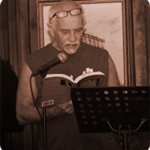
About the poet, Andy Clausen
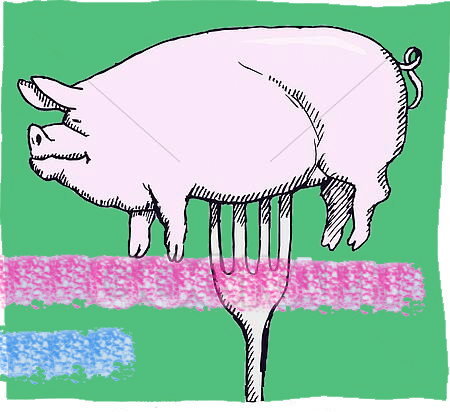
|
A thoughtful, informed reflection by inveterate world traveler and intentional community proponent Martin Dixon-Tyrer on what the pandemic has momentarily revealed to our blinded perceptions, unearthed both of the noble and base, and may bode for the future.
“A frozen moment when everyone sees what’s on the end of every fork”
–William Burroughs
|
California, 1999. I’m in bed, 23 floors up in a generic business hotel, trying to get ahead of the jet lag I know is coming, having stepped off a plane from Europe just a few hours earlier. Drifting in and out of sleep I feel the floor rumble as a large truck goes by. The rumble continues, and in the fog of jet lag I suddenly realise I’m nowhere near a major road nor am I on the ground floor. Earthquake! I bolt out of bed, the floor moving, rumbling, swaying for another 20 or 30 seconds. I hear a woman screaming somewhere, loud enough to make it through the sonic insulation of this airport hotel. Then it is over. I dress and go to the lobby, joining every other guest in the hotel, all of us safe and unharmed but shaken, definitely shaken.
For days afterwards what I’m walking on doesn’t feel so solid and certain anymore. It feels contingent, it could move at any moment. With time this feeling passes. (Everything passes with time, except those things that don’t).
Since then I’ve lived in Lima, a place where earthquakes happen with startling regularity. I’m no longer affected emotionally… they are just a fact of life. Living in an apartment building designed to withstand earthquakes helps, but then any building that stays standing in Lima for a few years is by definition safe in most earthquakes. Still, I never forget that the ground can move.
The coronavirus pandemic feels similar. The realisation, as with a first earthquake, that this doesn’t fit within the parameters of anyone’s everyday life. There’s a strange feeling that things will never be quite the same again, an awareness that the world can go into suspended animation and you’ll be sheltering-in-place wherever you happened to be when the music stopped.
The lovely nomadic life I’ve lived for the last few decades is not coming back in anything like its previous form. That old certainty that a first world passport means you can leave from wherever on a whim and go somewhere else is over. A distant blue horizon viewed from the deck of a sailboat midway across an ocean isn’t so inspirational if you’re worrying about whether you’ll be turned away when you arrive. I feel sad about that—it was a beautiful privilege. I also recognize that what I’m describing doesn’t come close to the genuine terror of a refugee’s experience, and that most of the world’s population never had the luxury of visa-free travel and an easy welcome anyway.
Things that seemed so solid for many, things like jobs, retirement plans, the economy, have in a matter of weeks turned out to not be so. For others less fortunate their anxiety about economic insecurity has proven correct. The froth on the economy in the west has been blown away with a single gust from a virus. It feels like that ‘frozen moment when everyone sees what is on the end of every fork’, as WiIliam Burroughs said of Naked Lunch.
“All that is solid melts into air, all that is holy is profaned, and man is at last compelled to face with sober senses his real conditions of life, and his relations with his kind.”
–Karl Marx
Half a century before Burroughs’ masterpiece something else was stirring. In a radical cabaret improbably located in Zurich the Dada movement began. It was a reaction to the insanity of the First World War—a war that was the consequence of industrialization, imperialism, nationalism, and the absurd posturing of men with big egos in charge of powerful states. (So nothing like today then…) Dada’s aim, in the words of Hans Arp, was to create “an elemental art to cure people from the madness of the age”. While it’s true that his ambition was not fully realised, one might reasonably say that much of the evolution of 20th century critical thinking flows from the seeds that Dada planted. For the 21st century we too need our version of Dada with the ambition to cure people from the madness of this age.
Some of that madness, partially obscured from view by money and social normativity, has been starkly revealed during this pandemic. Let’s start with the cacophony around coronavirus. In case you missed it, Bill Gates has a plan for world domination, to be achieved by injecting microchips into our bloodstreams through mandatory vaccinations. The World Health Organization is encouraging governments to break into people’s homes and abduct children. The virus is a hoax, and the symptoms are the effect of electromagnetic radiation from 5G phone masts, which can be cured with turmeric tea or frog venom or injecting bleach. The virus was fabricated in a lab in Canada, released in China in a controlled way (they already have a secret vaccine, don’t you know) then sprung onto an unsuspecting wider world allowing the Chinese to take over western companies at bargain basement prices.
It would be easy to see boundless idiocy as the order of the day, and sometimes the internet feels like a postmodern Tower of Babel—people bellowing at each other in incoherent languages, devoid of logic and credibility. But really it’s just noise, the Gilbert and Sullivan of discourse reborn as the thrash metal of the alt right and the clanging bells of new age woo woo. There is plenty of good analysis out there, serious and thoughtful, but you’re unlikely to come across it if ‘doing your own research’ means watching YouTube videos.
Of more tangible concern than the carnival of confusion is a dumbed down libertarianism, a vapid individualism, that asks only “what is best for me”, or in the more magnanimous version, “me and my nuclear family”. That virus has been infecting us for more than 40 years, Margaret Thatcher’s words still hanging in the air like droplets from a malignant cough: “There’s no such thing as society. There are individual men and women and there are families.” Sadly, for some, the pandemic confirms and reinforces the premise, a vicious cycle of unenlightened self interest.
It’s notable that gun sales spiked upwards as the pandemic became real for Americans. This cult of individualism and the nuclear family is most advanced there, and the self fulfilling prophecy that others will act aggressively in their own interest naturally leads to a need to defend one’s own individual turf (well, one’s stockpile of toilet paper and pasta anyway). Social trust dissolves further as the castle walls around the nuclear family are built ever higher. It’s hard to avoid seeing the consequences of this ‘what’s best for me’ behaviour—even the absurdity of hoarding toilet paper can easily be turned into a lesson of ‘do whatever is necessary to ensure comfort for yourself / your nuclear family first’. Because, without toilet paper, western civilisation collapses…
Then there’s the personal version of the philosophy of Disaster Capitalism (brilliantly exposed by Naomi Klein), where a crisis is seen as an opportunity to exploit and profit, garnering benefits for a few at the expense of many. Governmental actions to mitigate the impact of the pandemic could be seen as an example of care for all, but often they are received without a sense of communal obligation. It’s just a win for the individual, rather like Ayn Rand gleefully grabbing state healthcare in her later years having railed against it for most of her life.
While we’re on the subject of boundless idiocy and selfishness, reality has demonstrated conclusively that Rand’s Atlas Shrugged was, as many of us suspected, a badly written dystopian fantasy rather than a coherent philosophy (if you haven’t read it, don’t bother—it’s a dreadful novel). The strike by the ‘productive leaders’ bringing the economy to a standstill looks laughable now. Does anyone doubt that the economy craters when ordinary people, despised by Rand as ‘looters’, stop working? Would the reality of everyday life really be worse if most investment bankers and hedge fund managers, tax accountants and management consultants, marketing executives and stock analysts, and so on, went on strike? (Having done a couple of those jobs I can say with confidence: no, it would not be).
And yet…
In neoliberal-infected Britain over 750,000 people have volunteered to help during the pandemic. I watched this happen from news reports, open mouthed with disbelief, grateful for this beautiful demonstration that, notwithstanding decades of neoliberal indoctrination, not all hope is lost. People on the island, at least a good number of them, are not quite as utterly self absorbed as the sum of their other actions suggests. The seeds of mutual assistance lay there dormant, just waiting for the right moment to bloom.
Is this a green shoot of community breaking through the toxic sludge? Perhaps people will start looking to each other for help, and perhaps they will continue after the virus passes… repairing something for a neighbour, helping in the garden and sharing produce, shopping and cooking for each other, looking after the kids and the elderly. Exactly the kind of mutual aid that Kropotkin documented as an antidote to the cruelty of social Darwinism, that ‘war of all against all’ imagined by Hobbes.
Rebecca Solnit, chronicler extraordinaire of communities that arise after disasters, would not be surprised. She documents dozens of examples of communities that sprang up after disasters like Hurricane Katrina, the 1985 Mexico City earthquake, and the World Trade Centre attack in 2001. More recently, self-organised communities appeared in Greece during the Eurogroup’s brutal fiscal waterboarding of the country. It seems that, the concerted efforts of market fundamentalism and neoliberalism to change this notwithstanding, we are indeed cooperative and altruistic in our core.
Emissions are down, oil consumption is massively down, the skies and rivers are clearer, more birdsong can be heard. Probably, the rate at which we’re making other creatures extinct is lower. People seem to want to walk in parks and in nature more. City centres are being partially pedestrianised. Gratuitous air travel has more or less stopped. People are cooking more at home, noticing ingredients and thinking about what they are eating, adding more love into food. At a macro level people are working much less… and to some extent state distribution of money is enabling life to continue. The idea that we cannot change the economy substantially, that the only way the world can possibly work is through unfettered capitalism, that ‘There Is No Alternative’, has been shattered like an egg… and the pieces will never fit back together again. (It’s also worth noting for future reference that it didn’t take much to shatter that egg.)
So, while the path leading here is not one to be celebrated, certainly not one that we would have chosen, we are where we are. We have space to reflect, and consider whether we wish to return unchanged to the state of affairs that existed a few months ago. Just like after an earthquake there’s a desire for this to end, for it to be nothing more than a bad dream, to go back to what was, to replicate the prior status quo, maybe tinkering around at the margins a little. But there is also a possibility to go deeper, to evaluate our lives, to ponder on individual and collective values, to be radical in the sense of the original Latin, radix, root. And that feels inspiring.
I certainly don’t have a crystal ball to see the future, and I don’t think anyone does at the moment. However, some threads are becoming clearer. It seems unlikely that travel will return to previous levels for business as virtual conferencing, now trialled extensively through necessity, is so much more efficient. Tourism is going to take a long time to recover to previous levels, if it ever does. More services are going to be provided virtually, for example a consultation with a doctor utilising some basic medical technology at home or at a local centre. This will thankfully increase access to medical services for poorer populations. Online shopping will increasingly replace retail shopping, reducing the number of people required to work in dull jobs just to survive. All of that feels good. On the other hand, what happens to economic inequality? And to human social interaction? In a year will we still be a bit wary of each other, hesitant to get too close to others in public spaces, rarely hugging or touching? How will dating work? Will we become even colder and more isolated, those who can retreating into the nuclear family? That doesn’t feel so good.
“Don’t speak too soon, for the wheel’s still in spin… the order is rapidly fading”
–Bob Dylan, 1963
I feel that the pieces have not yet fallen to the ground, and that there won’t be a single all-encompassing model coming out of this time. Milton Friedman, dark prince of neoliberalism, once said “Only a crisis—actual or perceived—produces real change. When that crisis occurs, the actions that are taken depend on the ideas that are lying around. That, I believe, is our basic function: to develop alternatives to existing policies, to keep them alive and available until the politically impossible becomes the politically inevitable.” On that, at least, he was right.
One pole that some could move towards is community, love, mutual aid… simplifying our lives and helping each other to live well. Another pole is building a bigger wall, excluding others, looking after ourselves, whether that be at a country level, a family level, or an individual level. There’s also a question of whether we restart the insane focus on economic growth and consequent environmental degradation, or live in much greater harmony with the planet and with each other. Whether we try to recreate last year’s norm of extractive casino-capitalism fuelled by empty consumerism and unrelenting competition, or whether we try living cooperatively, testing out Universal Basic Income, sustainable agriculture, and degrowth. The ideas are out there—documented, thought through, explored.
“People make their own histories, but not in circumstances of their own choosing”
–Karl Marx
Individually we are all historical actors, relevant and valid, our every action inescapably contributing to the reality we live within. Collectively, too, we are historical actors, stronger than the sum of individuals. This can be our moment, a point of inflection, a fulcrum for change.
Like the Carnation Revolution of 1974 in Portugal, and the fall of the Berlin Wall in 1989, change can happen peacefully, and acting out a more beautiful world brings that world into being. Tangibly, practically, if we act with each other as we desire the world to be we are literally making it the way the world is. And if we keep doing it that’s the way the world stays.
Writing this at my friend Naomi’s beautiful farmhouse in Portugal I can’t help but ponder on the Carnation Revolution and the sense of possibility and hope that it turned into reality. Sophia de Mello Breyner Andresen, a Portuguese poet, captured it so well:
This is the dawn I waited for
The new day clean and whole
When we emerge from night and silence
To freely inhabit the substance of time.
It’s up to us, each of us individually, each of us collectively. The choice is in our hands.
— About the essayist, Martin Dixon-Tyrer

Made off-the-cuff in the midst of Covid lockdown by naturally humorous actor Chris O’Bray, the apathy, clunkiness, and deadpan delivery, coupled with enervation both from months of lockdown and the undiminished zeitgeist of late Capitalism, lends this half-intentionally comic video review of Jolly Rancher cereal a metaphoric resonance that transcends its 80s connotations. It seems to eloquently capture what Thoreau called “the quiet desperation” of the modern individual in the age of materialism. Should it be in an art museum? A museum of historic preservation?
— About the artist, Chris O’Bray
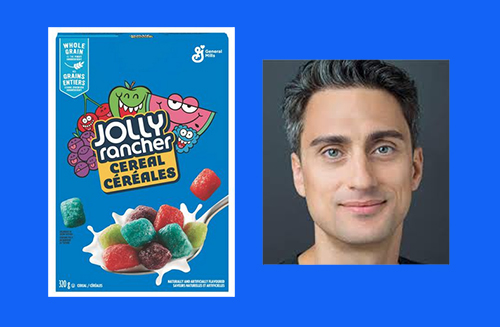
|
Philosopher Michel Meurisse on how New Media and Social Media have decimated attention spans, discrimination between Deep & Shallow, intellectual rigor, real connectedness, and general appreciation… and what might be done to escape being a Content Consumer
|
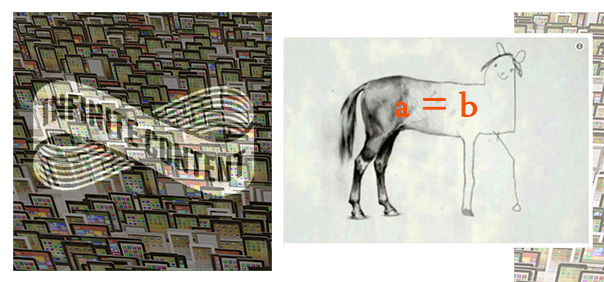
The Last Take
( or What It Means To Be Human In 2019 )
I.
It’s 2019 and something disquieting is emerging. We almost cannot see it because it’s too near, but it’s slowly beginning to come into focus. In our bodies it feels like something between weariness and nausea. It is one cultural problem that is not caused by our abject politics. But our current political despair is one of its symptoms.
The Deadspin writer Tom Ley came as close as anyone has yet to tracing its outlines. In a recent piece entitled “The Content Maw,” he pointed out how “the technologies that allow for and even demand the creation of content advanced to a point that the content creators, and thus consumers, have been left choking in the dust.” In short, the limitless proliferation of platforms for producing and receiving Content—TV, blogs, iTunes, Hulu, Spotify, Twitter, Facebook, Periscope, Netflix, smartphones, podcasts, etc—have created a cultural environment where anything that can be said is probably being said. Useful things and plenty of the utterly useless.
There are “good” TV shows, insightful blogs, and so forth, but they exist in the context of a boundless river of shit that swamps their significance. Good art and valuable information is automatically devalued by the sheer, limitless enormity of Content that we wade through on a daily basis. No show, or post, or idea is so intriguing that we will not likely forget it within 24 hours.
Putting it yet differently: Form has exceeded Content to such an extent that Content is now empty, fungible, completely interchangeable with other Content.
This week, for instance, I read a very insightful and well-written Op-Ed by Pankaj Mishra in the New York Times critiquing the current British ruling class over Brexit, and placing their malignance in the context of British Imperialist adventurism. Ten years ago, I might have sent it to a friend and discussed it, or thought about it more deeply for a few days. Not today. Today, information comes at us too fast to linger too long on anything. Shakespeare could return from the dead and publish a new sonnet in The New Yorker. It would be a sensational event—for a week, maybe. And then our attention would drift elsewhere and we would scarcely think of it again.
II.
This sudden explosion of Content has resulted in material changes in how we are human. We assume here the human not as a fixed form but as an ever-changing concatenation of possibilities of being, possibilities that are conditioned by our material reality.
III.
Here is what it means to be human in 2019.
It means to be cynical. In a world of limitless takes, think piece, opinions, art, music, the value of any Content seems to grow lighter… Where one could once take ideas seriously, for instance, today they are balloons floating away in the breeze. It is a trite point, but where everyone can be a “writer,” now no writer conveys any particular intellectual authority. Where limitless ideas are available, no idea is vital. Where new music is coming at us every millisecond, and all music ever created in the past is at our fingertips, individual pieces that once seemed essential or even sacred are cheap.
It means to be isolated. It is another trite point that, with the limitless number of choices for Content available, people increasingly are all on different channels. When I was younger, it seemed like every adult I knew could bond over the latest episode of MASH or Cheers. Today, any shared reference point has vanished. Moreover, we are alone because it simply takes a great deal of time to consume as much Content as we feel we need to, and consuming is, largely, a solitary activity. To watch the shows that appeal to us, listen to the podcasts that have been on our list, read the news sites that we want so that we stay informed, all of this takes up hours now of our day that are not spent interacting with others meaningfully.
It means to be frozen eternally with hesitation.
Once upon a time, I’d like to imagine that people consumed Content with the intent of doing something meaningful with it: finding a recipe online to then cook an actual meal; spending time on social media to actually meet with people in the real world; reading an article to actually then go engage with the world more fully. Somewhere along the way, something insidious happened: the process of consuming information somehow became not a means but the end in itself. We read far more news, blogs, gossip, data than could ever be practically useful to us. We watch cooking shows not to cook, but just to watch. We interact with others on social media not to form deeper connections, but to eavesdrop and remain alone.
Consuming Content is no longer a means, but a masturbatory ritual. We know that it is addictive (and now talking about our addiction is the newest form of masturbation), but we’re too far gone to come back.
Marx said famously: “Philosophers have only interpreted the world, in various ways. The point is to change it.”
IV.
Humans want to know things before we act. The “Content maw” preys on this natural desire. We naturally seek knowledge about other people on social media; we seek knowledge about the world through blogs and news sites; we seek knowledge online about things important to our life (what’s that rash on my leg, am I paying too much for car insurance, and so on). I spend hours on Spotify because I want to know more about my favorite musicians.
We have been lulled into a “paralysis of analysis.” The online world is full of professional knowers and their takes. Maybe we are all professional knowers now.
Kierkegaard wrote: “The present age is one of understanding, of reflection, devoid of passion, an age which flies into enthusiasm for a moment only to decline back into indolence.”
With every passing day, we are more content to Consume rather than to Act, to participate in the useless circulation of Knowledge than to Engage in the world. What today passes for Action is frightfully pusillanimous: a politician makes a heated remark and it gets replayed on the news for 24 hours. One celebrity says something “scandalous” about another celebrity, and we all agree that something has really “happened.” To show our political involvement, we post ardent, clever political opinions on Facebook, and all conspire together in the lie that we have “done” something. But in none of these cases has real Action ever occurred; we content ourselves with slights of hand to convince ourselves that something is actually happening.
V.
In my fantasy, this essay is the last take. After this piece, we decide that we have had our fill of Consuming and we can begin to step into life as it is.
The life that exists when we’re not Consumers… Cooking a meal with a friend… sitting on a park bench listening to the sounds of the city around you… making love with someone… walking in the woods… writing in a journal… playing a musical instrument… being together… listening to each other… caring for one another… taking photographs on good cameras… doing a crafts project… enjoying the feeling of freshly laundered sheets… having an intellectual discussion with a friend… sailing… swimming… shopping in a market… putting in a good day’s work at your job… playing with a child… repairing something in your house… meditating… jogging… practicing yoga… learning a new language… cradling a glass of red wine on a cold winter’s night.
The river of shit will flow on. Content will continue to come at us hot and fast, and we will always feel the urge to keep Consuming. The world will change when we are able to say, at last, that we have Consumed enough. We have seen enough. We know enough.
No one will give us permission. Just the opposite, the realm of Content will tell us that we need more before we are ready. Once we have consumed just a bit more… then we will be ready. Once we’ve browsed just a bit more… eavesdropped just a bit more… zoned out into the Screen just a bit more…
To decide not to be a Consumer anymore, therefore, is a leap of faith (another Kierkegaardian concept). To truly Act, to break free from the “paralysis of analysis,” one must simply do it. In this sense, you always take action before you are ready. This is the meaning of Action. Not to complete the circulation of Content—because it never completes, it just spins in an endless loop—but to suspend it entirely. To take Action is to rest in what knowledge you have, to rest in what you have Consumed, and know that it is enough, whatever it is.
VI.
To step into life is to simply step away from the world of screens and devices without a second thought.
All of the platforms that serve you Content. Break them and don’t look back. It’s time to burn the whole thing down and start over.
Only in breaking free from the realm of Content can we emancipate the arts and sciences. Writing can one day be writing again, and not empty Content. Music can be music again. Film can be film again. The truth can be true again.
It seems that colors themselves have faded (and greens can be green again, and yellows yellow).
If you think about it too long, or post about it on Instagram, you’re already lost. Just burn it all down, immediately.
In ceasing to be Consumers, we regain what it means to be human. When we all, collectively, cease to be Consumers, then we can begin to restore our garbage culture.
Step away from your Content and into the world.
— About the author
Professor Michel Meurisse is standing on a space rock traveling 67,000 miles per hour. What a feeling. Don’t try to find him on Instagram or Facebook, because he’s intentionally avoiding you. Not everyone: you specifically. In his free time, he enjoys waterskiing and regret.

|
The following vignettes are from Nights Redolent Of Death, a collection of dreamlike prose by Greek writer Costas Despiniadis, translated by Konstantina Georganta
|
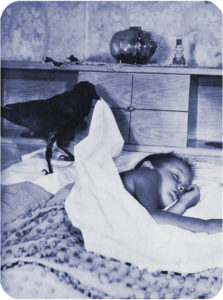
The Room
Night. Cold. I am walking around smoking, huddled up in my jacket. A soft rain has started. I turn into a small alley not knowing why. It’s not my usual route and I have probably never been here before. The alley is dark, quiet. Mud and water in puddles. The more I walk, the narrower the alley becomes. No houses on its sides, only high walls. I am under the impression that it is a dead end, but the thought of going back where I came from never crosses my mind. I keep on walking in absolute darkness. On my right, a small door. I open it and enter a low-ceilinged room. It’s empty and barely lighted by a candle in a corner. The room has a wall with three doors. The right and left ones are padlocked. I open the middle one, and what I find before me is a sign with huge red letters reading NIGHTS REDOLENT OF DEATH. I shut the door terrified, looking for the way out of the room. To my surprise, there is no door anymore. The empty room is now filled with books and papers, piles and piles of them, which I knock with my every move, and they drop down on my feet. In a minute, it is impossible for me to walk with all of these books lying around. I stand still in the middle of the room. I pick up a book and open it. All its pages are blank. I throw it away and pick up another. Same. I start going through all the rest in a frenzy. It takes me a moment to realize that no book has anything written in it. I want to escape this small room, but there is no door. I suddenly feel a cool breeze on my neck. I cannot understand where this breeze is coming from, as there are no doors and no windows anywhere. The breeze grows stronger. The candle is blown out and the room is sunk in absolute darkness.
The Lollipop
Night. I am sitting on a bench at the beach looking at the sea. There is an old lady nearby dressed in old rags selling lollipops in all colours on a half-wrecked cart. A little girl in dirty clothes, one of those selling tissues in the streets, passes by and stares at the cart. The old lady takes a lollipop and offers it to her. The little one hesitates. ‘Take it, my treat,’ the old lady says. The girl takes it with a smile, says ‘thank you,’ and goes away quickly holding the whole world in her two hands. A little farther down the road she meets someone, must be her father, who shouts at her like a madman in a language I do not understand and slaps her. The lollipop falls out of her hand and the little one starts crying. She tries to pick it up from the ground, but her father pulls her angrily by the hand and they walk away.
The Cat
It’s a quiet December night. Snow has been falling outside since early morning. I am sitting at my desk, reading. The radio can be heard in the background; a pointless political talk is on. Suddenly, my cat, lying until that moment unconcerned on his little rug, gets up, leaps and lands on a small bookcase right beneath the window. He is staring at something, staying still for a long time. Since all is quiet outside, I cannot really tell what he is looking at, so I return to my book, smiling at his ‘folly.’ Secretly, however, I am envious. What I wouldn’t give, if only for a moment, to look calmly at the snow falling in thick darkness. What I wouldn’t give, if only for a moment, for All Human To Be Alien To Me.
The Sparrow
I am crossing N. Square together with my friend T. We find a wounded sparrow trying to fly in vain. We decide to take it to a vet or an animal rescue. It’s Sunday and nobody is answering our calls. After many tries, K is the one who finally answers the phone and offers to help. A young blond kid with shiny blue eyes, who was playing right next to us, brings us a carton box. We punch three or four holes in it, pick up the wounded bird softly, and place it inside. We call a taxi, and just before T and I are about to go in, the kid looks me in the eyes and tells me with sorrow: ‘I so wish for the little bird to survive, Sir.’ ‘It will survive,’ I assure him, stroking his head, and I shut the door. In a little while, we are at the Nt. neighbourhood. We locate K and hand him the wounded sparrow. He examines it carefully. ‘Its eye, wing, and most probably its spine too are hurt,’ he tells us, adding, ‘It has a minor chance of surviving, but leave it with me and I’ll see what I can do.’ In three days I call K and ask him about the sparrow. ‘It died a few hours after you brought it to me,’ he answers.
A few days later I happen to pass by N. Square again. In the distance I see the kid who had helped us with the little bird approaching me, running. ‘What happened, Sir, did the bird survive?’ he asks with sincere agony. ‘It has survived, it has thanks to you,’ I answer, trying to avoid his eyes.
—About the author, Costas Despiniadis



























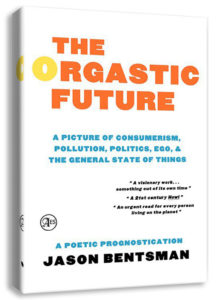

Recent Comments